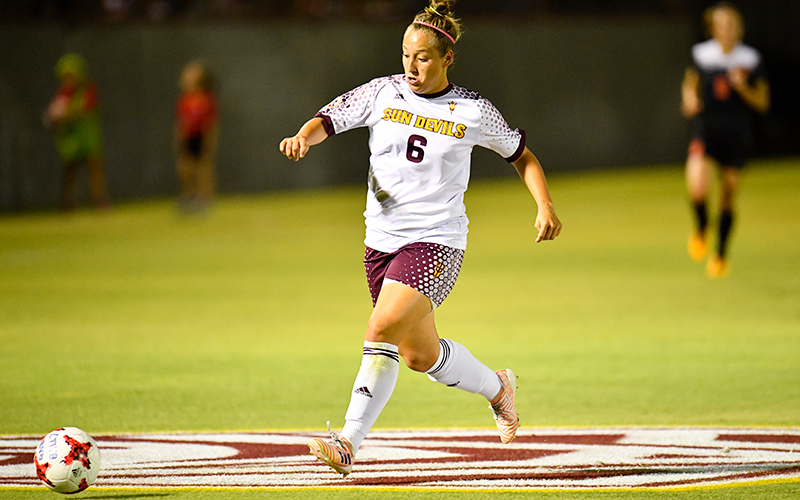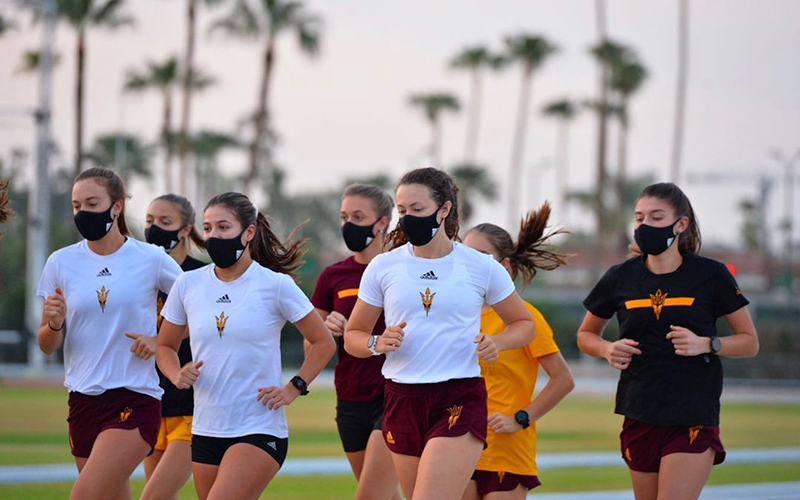
The postponement of the cross country season has presented a challenge for athletes who run on both the cross country and track teams. The cross country championship is scheduled in the spring, on March 15th, two days after the indoor track & field championships. (Photo courtesy of Will Edmonds/Sun Devil Athletics)
PHOENIX – When Cielo Meza heard that her team would be taking a bus to its first conference series at UCLA, she knew something was wrong.
“We fly everywhere, especially during Pac play, so getting on a bus – it was weird,” said Meza, who was a fifth-year senior pitcher on the Arizona State softball team at the time.
It was raining that day, March 12, and the mood on the ride was somber and emotional, Meza said.
About two hours into the trip, the bus stopped at a gas station. The coaches stood up at the front, woke up several napping players, and announced that the bus was turning around. UCLA had canceled the series and the Pac-12 had canceled the season.
“Every senior started crying,” Meza said. “I thought, ‘This is it. I might be done playing softball for good.’”
Meza is one of about 80 senior athletes at ASU whose final season of collegiate play was canceled in March due to the COVID-19 pandemic. That number has only grown as many fall and winter sports have been canceled or postponed due to the risks of the pandemic.
Nearly 200,000 athletes were competing or were expected to compete in Division I athletics in 2020, according to trends in NCAA participation reports. Every one of these athletes lost part, if not all, of their athletic season this year because of COVID-19.
For seniors, the impact of the pandemic has been especially difficult. They face challenges regarding their mental health, their future in collegiate athletics and uncertainty about what comes after.
Mental Health
The impact of the pandemic on the mental health of student athletes has been significant, according to a survey in May and April conducted by the NCAA of 37,000 student athletes.
“A majority of participants reported experiencing high rates of mental distress since the outset of the pandemic. Over a third reported experiencing sleep difficulties, more than a quarter reported feeling sadness and a sense of loss, and 1 in 12 reported feeling so depressed it has been difficult to function, ‘constantly’ or ‘most every day,’” according to the NCAA survey.
Bianca Tinoco is one of those athletes dealing with the mental distress caused by the pandemic.
“I didn’t handle outdoor track being canceled very well,” said Tinoco, a senior on the ASU women’s cross country and track teams. “I stopped running because I thought there was no point. I wasn’t mentally in the right spot to focus and crank out hard workouts.”
Tinoco was just finishing indoor track season, about to head into outdoor track season, when the pandemic canceled all competitions.
In the months since, she still hasn’t been able to compete, though she practices with her teammates every day.
Many athletes have found relief in the fact that they get to practice with one another, an option not offered to them in the spring.
However, being able to practice, but not compete, comes with its own mental challenges.
For Tinoco, “it’s like being stuck in limbo.”
Other athletes feel the same.
“Games are the one thing I look forward to every week,” said Jessica Hale, a senior soccer player. “So it’s hard to keep spirits high when there are no games.”
Hale said she is happy she gets to play and be with her teammates. It helps.
Lara Barbieri, another senior women’s soccer player, has it harder.
She is from Sao Paulo, Brazil and has been stuck in her home country due to travel restrictions, unable to join her teammates at practice in Arizona. She said she has been feeling the effects of isolation from her teammates and friends.
“I have to compete against myself all the time and I’m getting super overwhelmed,” Barbieri said. “I don’t know when I’ll get to come back and what’s going to happen with our season and so I’m very stressed.”
She is expected to finally arrive in Tempe on January 31 after quarantining in Mexico.
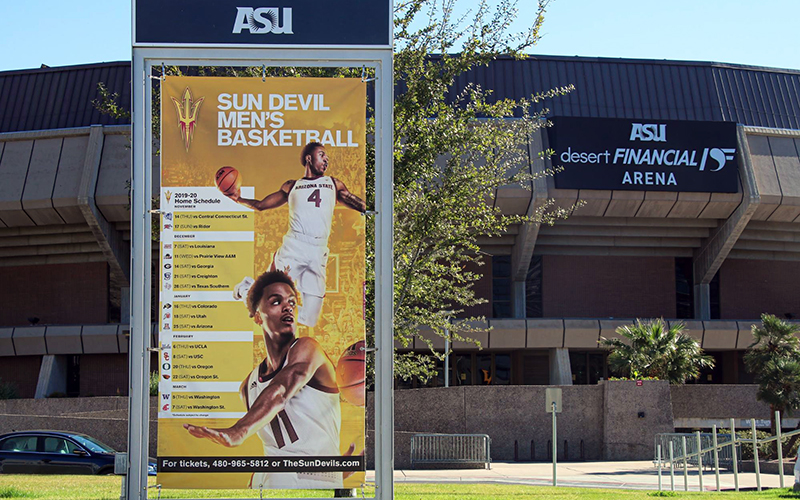
The Arizona State men’s basketball season ended abruptly before the Pac-12 tournament and then the team lost three seniors due to graduation. (Photo courtesy of Prince James Story)
Canceled? Or Postponed?
In March, the NCAA completely canceled competition for all spring sports, such as softball, baseball, and outdoor track. At that time, they did not cancel fall sports, like football, soccer and volleyball, which were set to begin play in August.
Over the summer, there was uncertainty about the fall season. Eventually, NCAA officials postponed fall competitions.
Fall athletes are now expected to play their season in the spring, alongside the spring athletes.
“Right now, that’s the plan and it will be overwhelming,” said Douglas Tammaro about fall and spring sports playing in the same season. Tammaro is the assistant athletic director of media relations for ASU athletics and is partly responsible for staffing, covering, and broadcasting all home games.
“We may end up hosting, you know, 20 events in one week,” Tammaro said. “We’ll have to staff them and cover them and we will do the best we can, but not everything is going to be perfect.”
Tinoco, who competes year round – cross country in the fall, indoor track in the winter and outdoor track in the spring – said she doesn’t understand how she can run a postponed cross country season in the spring, when she should be competing in outdoor track.
“I don’t really know what’s going on, to be perfectly honest. I don’t see how we can compete in both, so I take it like I’ve lost a cross country season,” she said. “It’s a real shame, too, because we have a really talented group of ladies that I think would have done well in cross country.”
For Tinoco, one of the most upsetting aspects of losing her senior cross country season is watching teams in other sports, schools and conferences get to compete.
The NCAA’s decision to postpone fall sports was just a recommendation – the decision has been left up to individual schools and athletic conferences to decide.
“I think it’s super unfair and it makes no sense,” said Barbieri. “I think the NCAA should just have a national rule. Everyone gets to play or nobody does.”
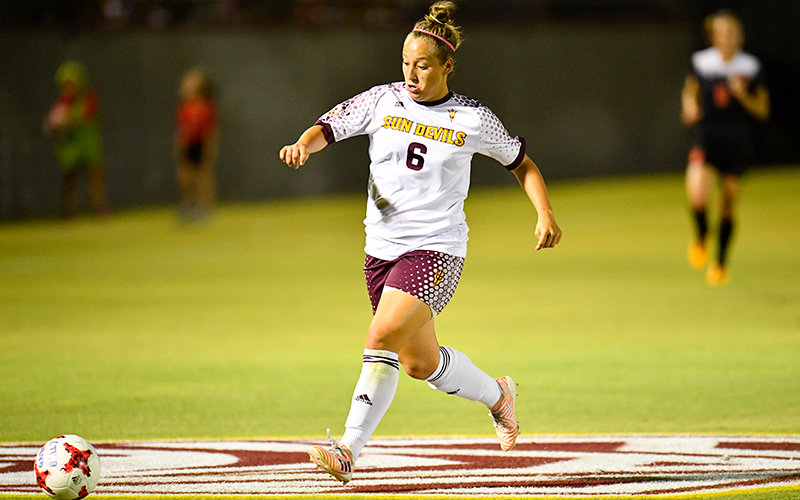
Lara Barbieri, a senior women’s soccer player at Arizona State, has been stuck in her country of Sao Paulo, Brazil, during the pandemic. She hopes to return by the end of January. (Photo courtesy of Sun Devil Athletics)
The fifth year option
Regardless of whether an athlete’s season is canceled, postponed or shortened, the NCAA is offering an extra year of athletic eligibility to all athletes affected by the coronavirus pandemic with one exception: winter athletes who had postseason competition canceled in March. This includes basketball players, wrestlers, gymnasts and all other athletes who lost their chance to compete in postseason tournaments.
For Jessica Ginn, an ASU senior gymnast, it really was the end.
“It was a reality check. It checked whether my full identity was strictly in gymnastics,” Ginn said. “Like, I thought, ‘Hey is sports the only thing in your life? Like, are you putting your whole identity in that?”
Ginn said her last competition as a Sun Devils athlete was successful and she was able to have a senior night to celebrate her accomplishments at ASU. Her future, she said, was unaffected by the cancellation of postseason athletics.
For other senior athletes competing outside of the 2020 winter sports season, the same may not be true. These athletes are faced with a difficult decision regarding their futures – whether or not to take the fifth year option.
On March 30, two weeks after the NCAA canceled spring competition, the Division I Council voted to grant all spring athletes an extra year, a fifth year, of eligibility to make up for the season they had lost due to COVID-19.
In August and then October, the fifth year option was also extended to fall and winter sports athletes respectively, whether they do or do not compete in a shortened 2020-21 season.
Initially, 28 ASU senior athletes have opted to take the fifth year option. This number only includes spring athletes, however, and is expected to be much higher.
For many athletes, taking an extra year of eligibility was the right option.
For Nicholas Cheema, a senior baseball player, a fifth year is much more meaningful than just gaining an extra season.
In October 2019, Cheema found out that his father had been diagnosed with thyroid cancer. Five months later, he learned that his final season of baseball had been canceled. He struggled with the idea that he might never play in front of his dad again.
“He was the one who would just go out and pitch to me every single day no matter how long I wanted,” Cheema said of his dad.
The fact that his father will now get to watch him play one more season is extremely meaningful to Cheema.
“Ideally he’ll come up and watch me and everything, but if not he still has it on his iPad, laptop, the TV, or whatever. He’ll be watching every game,” Cheema said.
Kaylee Antill, a senior on the track team, also sees the fifth year option as “a blessing in disguise.”
“I was in the hospital before the indoor conference meet (which was canceled) with some pancreatitis,” she said.
Since her health wasn’t at its peak during her senior season, Anthill feels the extra season will be an opportunity to prove herself.
The fifth year option doesn’t work for every athlete, however. There are financial, physical, and academic concerns that may bar some athletes from competing another year.
And age is a factor for some.
“I’m 24 now so your body starts to break down, I’m not going to lie,” Anthill said “That was the big question for me. Will my body be able to hold up for another season?”
The financial burden is also a big consideration.
“I want to take a fifth year but it will definitely depend on my financial situation,” Tinoco said. “If the coaches decide to invest in someone else, you know, that’s it, probably.”
Currently, all spring athletes at ASU who have opted to take another year are being offered a scholarship match from their previous season, thanks to donations from the Sun Devil Club.
Additionally, the NCAA adjusted its financial rules to allow teams to carry more members on scholarship. Schools also have the ability to use the NCAA’s Student Assistance Fund to help fifth year athletes.
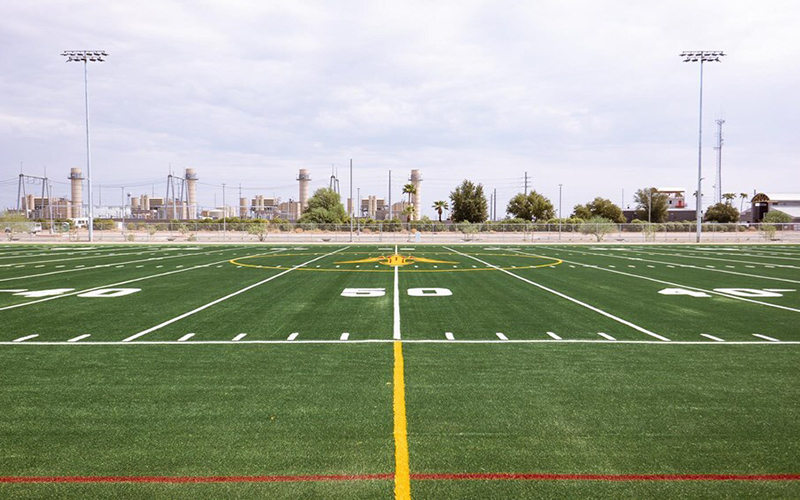
Many of Arizona State’s athletic fields were empty early during the pandemic as officials strived to learned more about the dangers of COVID-19 and its impact on athletes. (Photo courtesy of Sun Devil Athletics)
Uncertainty Ahead
The uncertainty and stress many of the senior athletes are feeling has been further compounded by the fact that daily COVID-19 cases are increasing nationally, according to the Centers for Disease Control and Prevention.
The ASU football team was forced to cancel two games of its pared-down seven game season due to a COVID-19 outbreak on the team.
As COVID-19 cases continue to rise, athletes worry about what’s next.
“I’ve been trying to avoid this question but yeah, what happens if we can’t play in spring?” Meza said. “I don’t know. No idea.”
Ivy League colleges announced on Nov. 12 that they would be canceling all winter sports and delaying the spring season. They had previously announced in April that they would not be allowing senior athletes to take a fifth year of eligibility at their schools.
Other schools could follow this example if the risks of the pandemic become too high and the challenges of keeping senior athletes around, with freshman ones coming in, becomes too difficult.
“I’m currently in denial that they can cancel track season. I’m trying to stay optimistic, but my anxiety is through the roof,” Tinoco said.
ASU’s Katelyn Carballo, a senior beach volleyball player who lost her spring season, is trying to appreciate every moment she has left, regardless of what may happen in the future.
“I can’t believe I ever took this experience for granted,” she said. “This year, it has taught me a lesson to always come ready to play and do your best and work hard. Never take it for granted, because I could have had my last tournament.”
Ultimately, it will be up to ASU, the Pac-12 and the NCAA to decide whether competition is worth the risk.
